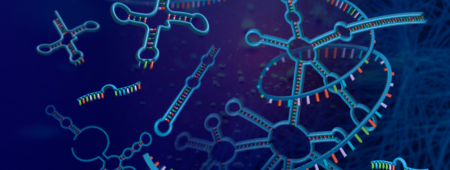
Hertz Fellow Launches Biostate AI, Coupling RNA Sequencing and Health-Focused AI
Imagine a computational model that captured the behavior of every molecule inside a living cell and could predict how each molecule would change with health, disease or exposure to drugs. Such a model, powered by artificial intelligence, would be a boon to drug development, disease diagnosis and other areas of personalized, predictive medicine.
Today, the ability of AI tools to create such a model is largely limited by their need to be trained on vast amounts of molecular data, which is expensive and time-consuming to collect.
Hertz Fellow David Zhang, however, has a solution. Zhang’s latest venture, Biostate AI, is offering affordable RNA sequencing to researchers, repositories and companies with one bit of fine print: The company will use the sequence data to train their AI models.
“I think that AI can actually solve one of the main problems of drug development, which is that a lot of drugs don’t transition well from preclinical animal studies to humans,” says Zhang. “By better predicting the effect of drugs on humans, we can both speed up drug development and reduce our dependence on animal lives.”
Eventually, the kind of tool Zhang envisions could be used by a researcher to ask what a potential drug would do to each cell type and organ in a person’s body.
Zhang, a former professor at Rice University who previously founded NuProbe Inc. and Torus Biosystems, launched Biostate AI in 2023. To date, the company has raised more than $4M in venture funding, including an investment from Hertz Fellow Michael Schnall-Levin, as well as AI advice from Dario Amodei, also a Hertz Fellow.
DNA as a Tool
When he was named a Hertz Fellow in 2006, Zhang already had his mind set on using genetic material as a tool. His graduate work at the California Institute of Technology initially explored how DNA molecules could be used to carry out massively parallel computing. Then, Zhang changed course to study how to fold DNA into shapes useful for emerging nanotechnologies.
“I was inspired by this idea that molecules can do computation,” says Zhang. “If we could harness that computational power, then we could do something really important with it. Now, it turns out that maybe these molecules are more important as a tool for doing biology than for computation.”
During a postdoctoral fellowship at Harvard Medical School, Zhang also started to explore the entrepreneurial world; he had developed probes that could distinguish genetic sequences from each other better than anything on the market and he wondered whether he could commercialize the technology.
“I started doing a little bit of business development during that time,” says Zhang. “I threw everything against the wall and sent over a hundred cold emails to different molecular genetics companies at the time. That experience gave me some of my first lessons in how the industry worked.”
Eventually, Zhang licensed that first technology to Nanostream. Then, after his graduate degree, he joined the faculty at Rice University. Even as an academic researcher, however, he kept his mind finely tuned to ideas that would lend themselves to future product development. In 2021, he founded NuProbe to commercialize a technology that could detect small, rare genetic variations in DNA — particularly useful in detecting and diagnosing cancers. In 2022, he founded Torus Biosystems around a PCR technology that could more quickly amplify DNA and RNA compared to other methods.
Merging AI and Biology
Beginning around 2016, Zhang’s lab at Rice collaborated with a Microsoft Research team to explore how to apply AI to DNA sequencing. Zhang loved the idea of using AI to tackle biological problems.
“Our brains are only so big; we can only keep track of so many things at a time,” he says. “But if you look at the complexity of biology, every single cell has more than 30,000 genes and then we have many, many cell types. So there’s a vast amount of biological data that I think is beyond the capability for any one human brain to deeply understand it.”
When large language models such as ChatGPT began drastically improving in recent years, Zhang saw the potential for AI-powered models that could make powerful predictions about human health. At the same time, he had developed a new method of sequencing RNA molecules more efficiently — and cheaply — than most methods. Sequencing the RNA molecules present in a cell can tell researchers about what genes are being actively transcribed and used by a cell at any given time.
Zhang left his academic job in 2021, first to focus on NuProbe and then to launch Biostate AI. Biostate AI offers RNA sequencing at less than half the cost of most other companies, and retains a copy of all RNA sequencing data for their own non-exclusive use. Initially, Zhang is using that collected data to learn about drug toxicity.
“We want to use RNA sequencing data to be able to predict, on an individual level, how someone will react to different drugs,” says Zhang. “Today, around 40% of drug trials fail for safety reasons, and we think AI can help change that.”
Supported by Hertz
While still in graduate school, Zhang connected with other Hertz Fellows who had similar interests to his; their paths often overlapped at summer retreats. As his career progressed, he says that he continued to lean on their expertise to build and commercialize his technologies.
“I still meet with these fellows every so often, and it’s been great to see how our careers have all progressed and to get support from them,” says Zhang.
In honor of that support he has received from being part of the Hertz community, Zhang hopes he can also offer mentorship to younger fellows who have questions about entrepreneurship.
“Transitioning into entrepreneurship was challenging for me at times because I didn’t have a mentor in that space, so I try to be really responsive to younger scientists who are in that place in their careers now,” he says.
